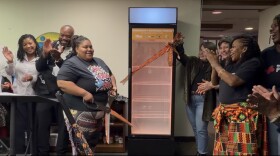During the coronavirus pandemic, there has been a bombardment of numbers and it can be hard to make sense of all the statistics. But two researchers are trying to help people digest COVID-19 data.
Dr. Mauricio Garnier-Villareal and Dr. Stephanie Rivera Berruz are both assistant professors at Marquette University and wrote an article about reading COVID-19 data. The two noticed that the spread within Milwaukee has unsurprisingly tracked the hyper-segregation of the city.
>>The Latest WUWM & NPR Coronavirus Coverage
>>New Survey Highlights Racial Disparities In The Coronavirus Pandemic
For the last couple of weeks, Rivera Berruz says that the spread has been rather aggregated on the north side of Milwaukee, which is historically the black part of the city. Rivera Berruz specializes in philosophies of race, gender, and sexuality. She says the infection rates are especially concerning when they're happening in a community that is already considered at risk.
"They're not going to have necessarily the same access to medical resources. And, this is something much broader about the history of Milwaukee in its in the ways in which its communities have been constructed along the north, it's west and south portions," she says.
"It's clear this type of infection is going to disproportionately affect people with lower income and in Milwaukee and in the country in general, we know that income is related to race." - Mauricio Garnier-Villareal
Garnier-Villareal, a data scientist with Marquette's College of Nursing, says that one thing is evident from the data: we are not all in the same boat when it comes to this disease.
"It's clear this type of infection is going to disproportionately affect people with lower income and in Milwaukee and in the country in general, we know that income is related to race," says Garnier-Villareal.
Both researchers noted the constraints placed upon the data due to limited testing. They reiterated that the better testing and tracking data is aggregated now, the more effectively prepared people will be in the future — come what may.
During this pandemic, WUWM's Bubbler Talk is focusing on the coronavirus and its impact on the Milwaukee area. If you have a question, submit it below.
_






